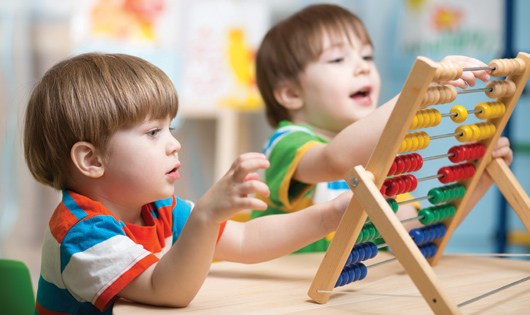The Importance of Early Education
Giving Your Child the Best Chance to Succeed

By Daniel Beauregard
In decades past, it was common to leave a child at a day care or
preschool and expect little more than that the staff keep him or her safe and occupied while the parents were at work. But as educators learn more about what and how children learn in their first few years, early education has come to mean much more than simply dropping a child off at a day care doorstep.Many experts consider the early years, from birth to age 4, to be the most important developmental phase of a child’s life.
“The human brain never grows any faster, making any more connections, than during the early years of life,” says Kristin Bernhard, Deputy Commissioner for System Reform for Bright from the Start with the Georgia Department of Early Care and Learning (DECAL). “Anyone who’s been around infants knows they are not the same two days in a row. Even babies are learning so much every day.”
Many early education facilities develop programs that take advantage of a young child’s natural curiosity. At The Goddard School on Windward Parkway in Alpharetta, children learn colors, letters and how to take direction, among other simple but important things. And these lessons are presented in a way that engages and excites young minds.
“It’s extremely important to start a love of learning at a young age,” says Jenna Ellis, the school’s director. “If a child is stagnant in their learning environment, typically a child doesn’t love coming to school. They’re not learning new things. They’re not excited. They’re not passionate. We want to make sure children feel nurtured, and feel love and passion from our teachers. They’re happier at school when they’re learning.”
That emphasis on excitement extends to the teachers, who are given the freedom to create their own lesson plans. Without that input, “our teachers won’t be passionate,” Ellis says.
Education and early childhood experts agree that parents should start looking for an early care center as soon they’re expecting, so they can get on the waiting list of a high-quality program. Many centers take children as young as six weeks, which is usually when parents are returning to work after maternity leave.
Aspects of Development
There are four aspects to every child’s development that both parents and educators should watch for. The curriculum of any quality early care or pre-K program should feature learning activities that correspond to all four aspects.
Cognitive: Teachers read to children, sounding out the words and showing them objects to illustrate their meaning. With toddlers, the teacher may help them with hands-on problem-solving activities, such as putting blocks through a cube sorter, or asking open-ended questions and coaxing them along the way, which improves literacy and problem-solving skills.
Social: Facilitating a child’s social learning can be as simple as looking into his or her eyes and mirroring the emotions they’re experiencing. The teacher can engage directly with the child, eliciting a back-and-forth interaction between the child’s gestures and the teacher’s responses. With toddlers, this form of interaction may look different. At that age, the social domain of learning focuses more on teaching them how toget along with preschoolers and to take turns and positively engage with each other.
Emotional: Teachers give positive feedback to young children or toddlers and teach them words that validate their emotions: If a child or toddler is crying, teachers can help them understand the words — such as sadness or loneliness — behind their feelings.
Physical: To encourage healthy living from an early age, teachers engage with their students in activities that hone fine motor skills and teaching them how to use their fingers to develop writing skills. Toddlers engage in activities such as running outside, jumping and throwing balls to further develop motor skills.
Accreditation
Accreditation is your guarantee that a program meets or exceeds minimum standards and is highly maintained. Although each is different, many agencies, such as Georgia’s Bright from the Start or the National Association for the Education of Young Children (NAEYC), support individual programs with rigorous review criteria and a list of definitive yardsticks that includes ratings systems.
Early care and pre-K facilities follow minimum state requirements, but both NAEYC and Bright from the Start take those one step further to ensure parents get the best early education possible for their child and remain well-informed along the way.
Bright from the Start, which oversees approximately 5,000 child care centers throughout the state, uses a Quality Rated certification program to give parents detailed information on different facilities.
Childcare centers that receive Quality Rated certification adhere to such standards as a lower teacher-to-student ratio, higher credentials and qualifications for teachers, and regular assessments. They also place an emphasis on health, safety and physical activity. For more information, visit qualityrated.org.
By submitting to the Quality Rated program, these centers “are agreeing to participate in rigorous coaching for teachers” and offer “better classroom materials,” Bernhard says, adding that almost 1300 child care centers in Georgia have been rated through the program.
But those aren’t the only rigorous accreditation programs providing school reviews. The Primrose Schools, with child care education centers open or in development in 29 states, are accredited by AdvancED, a nonprofit organization that conducts reviews of primary and secondary schools around the world based on its Standards of Quality. The Goddard School, with more than 400 schools in 35 states, is also accredited by AdvancED.
When searching for an early education facility for your child, take note of each school’s different accreditations. Paying close attention to the curriculum, staff and certifications will help you get a clear picture of each school’s strengths—and help ensure that your child is enrolled in a safe, positive environment with the tools to help him or her learn and develop to the best of their ability.








